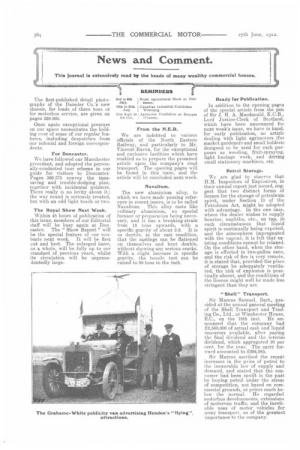News and Comment.
Page 14

If you've noticed an error in this article please click here to report it so we can fix it.
This Journal is extensively read by the heads of many wealthy commercial houses.
The first-published detail photographs of the Daintier Co.'s new chassis, for loads of three tons or for motorbus service, are given on pages 358-360.
Once again exceptional pressure on our space necessitates the holding over of some of our regular features, including despatches from our colonial and foreign correspondents.
For Doncaster.
We have followed our Manchester precedent, and adopted the personally-conducted tour scheme in our guide for visitors to Doncaster. Pages 366-375 convey the timesaving and trouble-dodging plan, together with incidental pointers. There really is no levity about it ; the way round is seriously treated, but with an odd light touch or two.
The Royal Show Next Week.
Within 48 hours of publication of this issue, members of our Editorial staff will be busy again at Doncaster. The " Show Report" will be the special feature of our contents next week. It will be first out and best. The enlarged issue, as a whole, will be fully up to our standard of previous years, whilst its circulation will be unprecedentedly large. REMINDERS
2nd to lith t Royal Agricultural Show at Don July. J cauter.
iota to SOth Canadian Industrial Exhibition July J Winnipeg. Tall Sept. to Agrimotor Exhibition at Bourges 0th Oct. ; (France).
From the N.E.R.
We are indebted to various officials of the North Eastern Railway, and particularly to Mr. Vincent Raven, for the exceptional and exclusive facilities which have enabled us to prepare the promised article upon the company's road transport. The opening pages will be found in this issue, and the article will be concluded next week.
Navaltum.
The new aluminium alloy, to which we have made passing reference in recent issues, is to be called Navaltum. This alloy casts like ordinary aluminium, no special furnace or preparation being necessary, and it has a breaking strain from 16 tons upwards, with a specific gravity of about 2.6. It is so ductile, in the cast condition, that the castings can be flattened on themselves and bent double, without showing any serious cracks. With a slight increase in specific gravity, the tensile test can be raised to 30 tons to the inch. Ready for Publication.
In addition to the opening pages of the special article from the pen of Sir J. H. A. Macdonald, K.C.B., Lord Justice-Clerk of Scotland, which have been announced for next week's issue, we have in hand, for early publication, an article dealing with light agrimotors (for market gardeners and small holders) designed to be used for such purposes as weeding, fruit-spraying, light haulage work, and driving small stationary machines, etc.
Petrol Storage.
We are glad to observe that H.M. Inspectors of Explosives, in their annual report just issued, suggest that two distinct forms of licence for the storage of petroleum spirit, under Section 10 of the Petroleum Act, might be adopted with advantage. In the one case, where the dealer wishes to supply benzine, naphtha, etc., on tap, in such circumstances that liquid spirit is continually being exposed, and the atmosphere impregnated with the vapour, it is felt that existing conditions cannot be relaxed. On the other hand, when the storage is effected in two-gallon cans, and the risk of fire is very remote, it is stated that, provided the place of storage be adequately ventilated, the risk of explosion is practically absent, and the conditions of the licence might well be made less stringent than they are.
"Shell" Transport.
Sir Marcus Samuel, Bart., presided at the annual general meeting of the Shell Transport and Trading C.ro., Ltd., at Winchester House, E.G., on the 19th inst. He announced that the company had £2,560,000 of actual cash and liquid resources available, after paying the final dividend and the interim dividend, which aggregated 20 per cent, for the year. The carry forward amounted to 2294,985.
Sir Marcus ascribed the recent. increases in the price of petrol to the inexorable law of supply and demand, and stated that the consumer had been spoilt in the past by buying petrol under the stress of competition, not based on commercial grounds, at prices much below the normal. He regarded motorbus develonments, extensions of motorvan traffic, and the inevitable uses of motor vehicles for army transport, as of the greatest importance to the company.






























